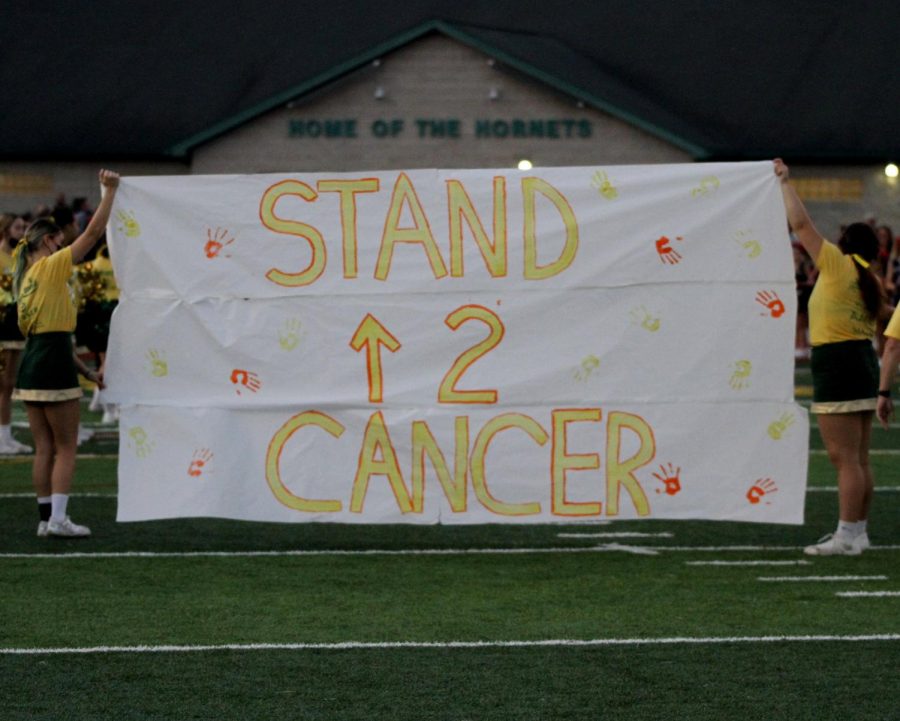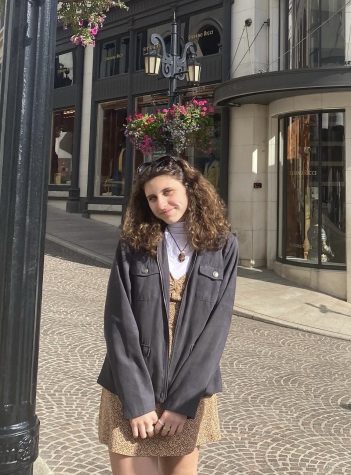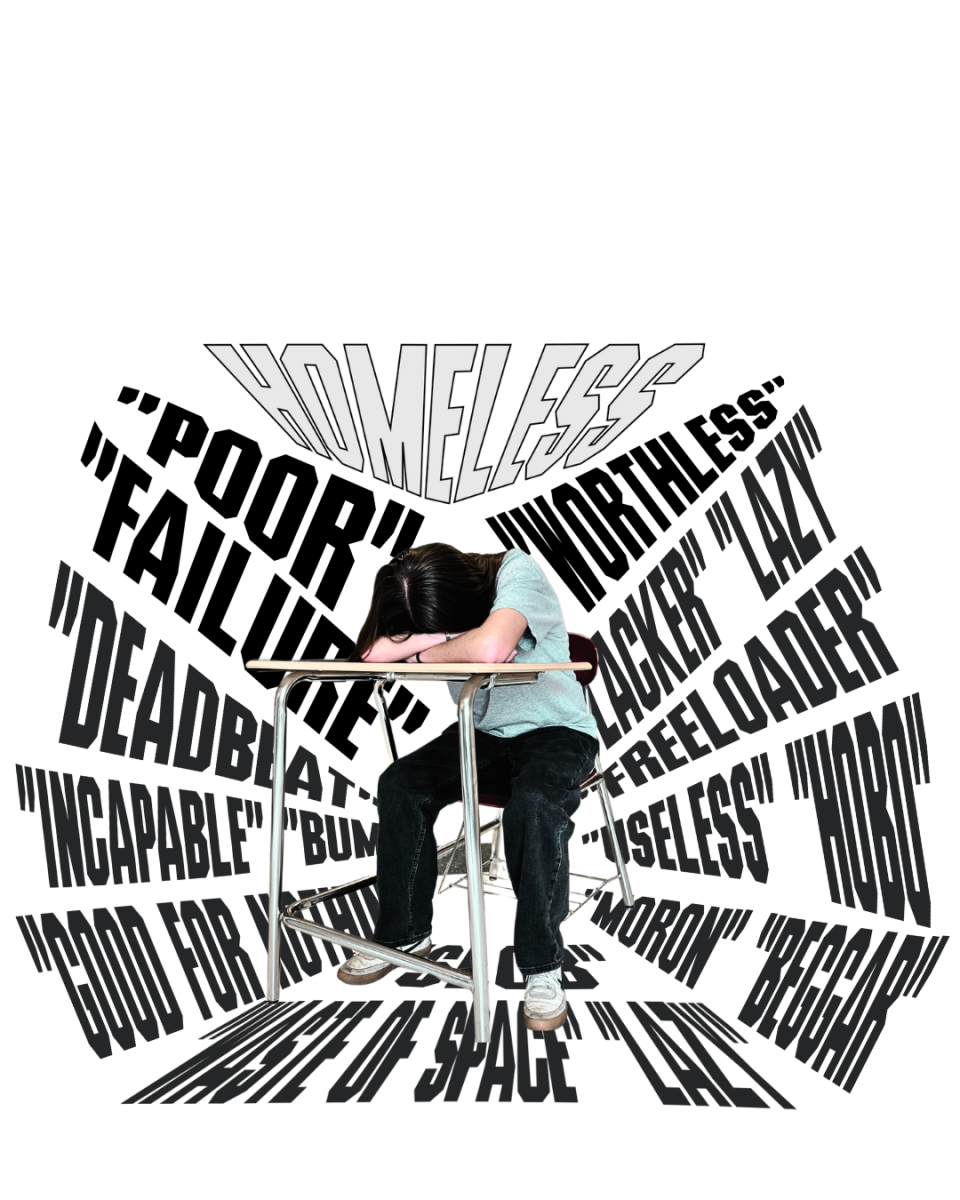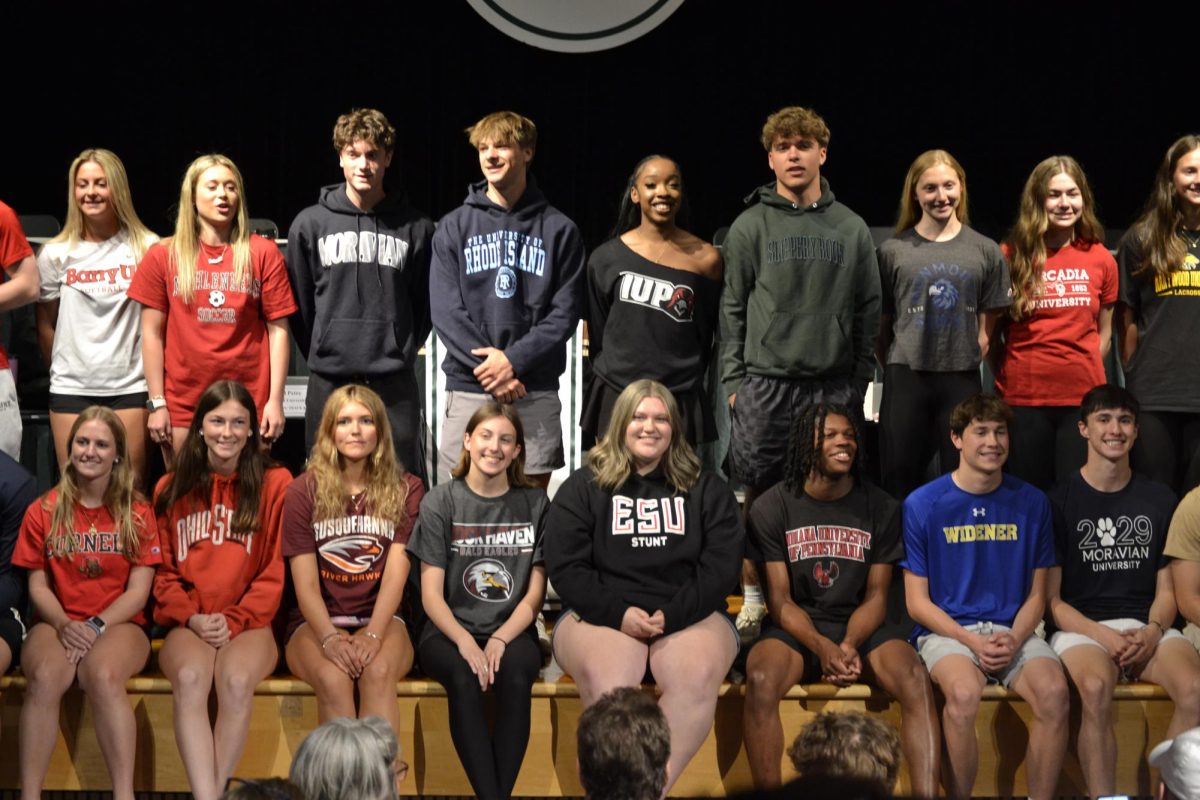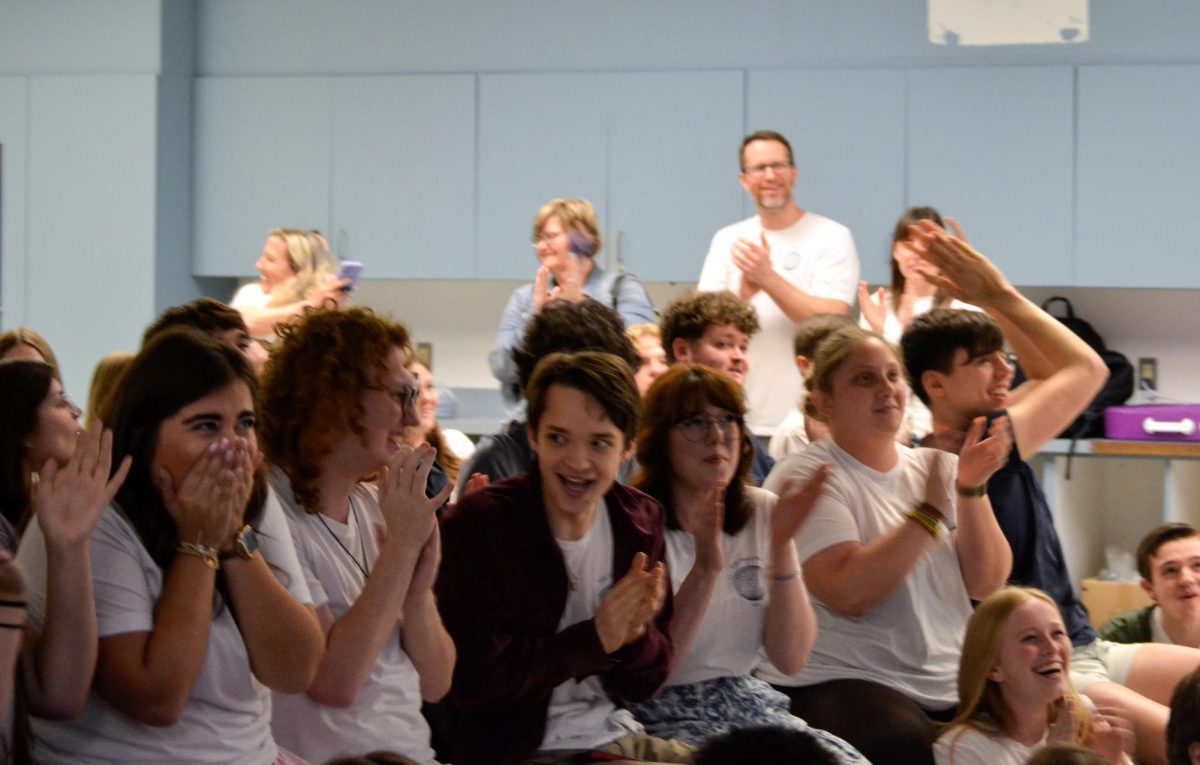EHS athletes reach out with support
November 10, 2021
This previously ran in our October 2021 print issue.
For many, the word “sports” means athletes elbowing and wrestling with opponents, adrenaline pumping through bloodstreams, and battling the ups and downs of wins and losses, but for most athletes, there is a whole other meaning.
Gold Out
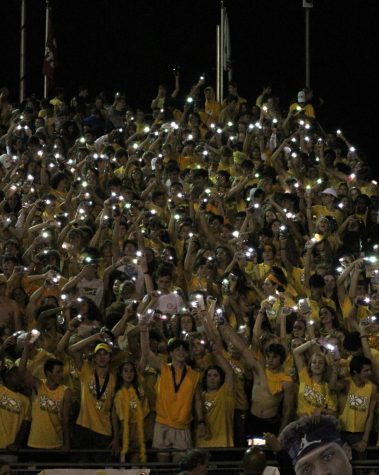
In mid-September, gold t-shirts with the words “Peace, Love, & A Cure” printed in dark green were displayed by almost all members of the EHS student section.
The gold uniformity had the purpose of raising money and awareness for pediatric cancer within the East Penn community through football’s Gold Out game. Proceeds from t-shirt sales and the 50/50 raffle held during the game all went towards pediatric cancer research and a bigger fundraiser in the spring, “Shave for the Brave.” In total from the Gold Out, they raised about $4,000.
The Gold Out game, as well as the Shave for the Brave fundraiser, are coordinated by Emmaus’ Pediatric Cancer Club. The club’s secretary, senior Madeline Conway, sees the Gold Out as part of a bigger picture, appreciating the greater significance of community support.
“It’s a really, really crazy feeling and experience,” says Conway. “It’s kind of hard to put into words, actually, especially as we get closer to Shave for the Brave; that is like a life changing experience, and people don’t really get that until they go. So, yeah, it’s really cool to see all the kids and the community members getting involved.”
Coach Harold Fairclough appreciates the opportunity games such as the Gold Out present to unite people of different backgrounds and beliefs, and the example they set for athletes.
“It’s awesome to see the entire community come together to support a special cause. I think it’s important for our kids to understand the impact they can have when they come together to support a cause or something they truly believe in,” says Fairclough.
Senior varsity starter and captain Jaden Delgado understands the importance of unity, and games where everyone can wear the same color, rally together, and support each other. According to Delgado, multiple players on the Emmaus football team wore their Gold Out shirts under their jerseys that night in support of the shared objective.
“I think it’s super important [that Emmaus continues to do fundraisers through athletics]. You’ve got to fundraise for certain things such as pediatric cancer, breast cancer, Down Syndrome, because, you know, we have that stuff around us every day,” says Delgado. “We’ve got to show our support and pay homage to them.”
Autism Awareness
Also in mid-September, Emmaus girls soccer went blue for their first-ever Autism fundraiser — an inspiration for all competition sports.
Junior Madison Woodward and her family initiated girls soccer’s Autism awareness work this year, linking the proceeds to a larger organization they are involved in, Autism Speaks. Fundraising from the game came from selling 50/50 raffle tickets, pom poms, and bracelets with “Autism Awareness” written out on them.
“We just wanted to raise awareness because people don’t really know a whole lot about Autism,” says Woodward. “We just wanted to bring awareness to it and educate people about it.”
Senior Kaitlyn Ewing appreciates the fact they are all teenagers learning about the importance of unity at a young age and how the fundraiser elevated team spirits and their unity as a whole.
“I think it just brings us all together as one team, one family, just supporting something that’s important to one girl on this team,” says Ewing.
What came as somewhat of a surprise to Oswald and her players was the commitment of the opposing team, Methacton, in their design of their own blue shirts to support the event. In addition to wearing blue, the team contributed money to the fundraiser, bringing the total proceeds from the game to around $400.
Ewing and her fellow teammates appreciate Methacton’s contributions and overall support of their goal to raise money and spread knowledge.
“That was great: just being able to support something that we were doing, even though they’re an opponent. It was really good,” says Ewing.
Senior Hannah Yencho enjoyed seeing all the blue around the field from both teams and views causes such as Autism as opportunities for teammates — no matter the jersey — to support each other.
“Everything that we go towards — whether it’s Autism awareness, whether it’s breast cancer, whether we’re supporting another team — we’re all going towards one goal of raising money for somebody,” says Yencho. “So if it’s not, you know, affecting us personally, we’re very supportive towards them. We’re just backing Maddi for Autism awareness with her brother and everyone else who is going through that.”
Coach Sarah Oswald believes it is important to encourage similar events in high school so athletes can explore their passions outside of sports and have the chance to weave them together and be a part of something bigger.
“I love to support their interests, and I think that it’s awesome that they want their team to be a part of something that they believe in, something that’s important to them. It just provides everyone an opportunity to see something that we may not see on the soccer field from them, but the kindness and the support that they want to show to things that are important to them,” says Oswald.
Type One Diabetes
Earlier this month, Emmaus boys soccer brought back a fundraiser that has a history of directly affecting athletes on the team, making it close to home for most players.
Boys soccer first became involved with Type 1 Diabetes when in the 2019 season, Patrick Walsh was diagnosed with the disease. His mother, wanting to initiate a fundraiser through boys soccer, organized one with the assistance of now junior Ryan Latchford’s mother; both Latchford and his mother have Type 1 Diabetes. The team sold t-shirts and sent all proceeds to the Juvenile Diabetes Research Foundation (JDRF).
Because of the COVID-19 pandemic, the soccer team was unable to continue the event last year, but brought it back this year with Latchford’s mother running the event. This year, the team sold dri-fit t-shirts so they could wear them in warm-ups and with the intent fans would wear them more often. The team raised $1,158 in total from the game.
“There’s definitely a lot of kids at our school that have Type 1 Diabetes,” says Latchford. “Patrick Walsh, who was just here, had it. I have it. There’s many kids I could name, but it’s just one of the things that we want to raise awareness for… It’s just good when people understand, you know, other people’s lives, and the stuff that they have…”
Senior Jaeden Amtao considers spreading awareness of causes that affect people globally an important endeavor that everyone can participate in.
“I think it definitely brings joy within different people, you know, people from different backgrounds coming together to support a mutual cause. I think that’s a really important part of it,” says Amato.
Coach John Cari notices the turnout of fans and support of players is prominent around games like these because it’s for a good cause, and in their case, for “one of their own”.
“I think that’s what high school sports is really about. It’s about playing with your classmates, families, [and friends] that have been together for a while… that’s what high school is about,” says Cari. “I think that’s one of the blessings of being a high school player and enjoying a season is having your friends, and having family, and that camaraderie of representing your school. And I think that’s why I do this.”
Spike Out Cancer
Girls volleyball celebrated the revival of Spike Out Cancer Night, a game near and dear to coaches and players.
Northampton High School volleyball coach Jessica Finlayson, who was diagnosed with brain cancer in the summer of 2018, passed away in January of 2021. After her death, Finlayson’s mother established the Jess Finlayson Memorial Scholarship Fund; every year, two senior girls and two senior boys on the Northampton volleyball team are awarded money towards college. Additionally, she fabricated the Jess Finlayson Foundation to raise money for brain cancer research.
Senior varsity setter Kassidy Hallman was Finlayson’s cousin and varsity Coach Bri Giangiobbe was one of her friends, emotionally connecting the team to the cause.
“Specifically, it [Spike Out Cancer Night] meant a lot to me just since it was for my cousin,” says Hallman. “And it’s just — I don’t even know — crazy seeing how many people come out to support. And like, that’s a night where we have probably the most fans we get for a game.”
Spike Out Cancer Night was dedicated to Finlayson after her diagnosis in the 2019 season and again in the 2021 season after her passing. (The event went virtual during the 2020 season and essentially did not happen). To raise money, the team made and sold t-shirts and basket raffles, and maintained the snack stand, generating a total of $2,352.
The girls also set up a wall where fans could write the names of people they know who are currently fighting, or who have recovered or passed from cancer, and each athlete created and presented a poster dedicated to someone in their life affected by cancer.
For varsity player junior Isabelle Russo, cancer has always had a place in her life, due to the many family members she’s had with the disease. In her eyes, the end of the night was the most impactful, when players shared their personal connection to cancer.
“…It brought, like, a lot of personal meaning into the night,” says Russo. “You got to hear everyone and how they have experience with cancer and who they know; so I thought that was really special.”
Coach Giangiobbe observes an emotional tone throughout the entire night, as cancer is a disease that everyone has a connection to. Prior to the game, she instills ideas in her players in hopes to broaden their perspective on the true meaning behind the event.
“I really create a focus going into the game of that it’s for such a good cause, and regardless of the match, we’re here to support it, have fun, and really just remember all those people that are fighting or have lost their lives to cancer,” says Gionbiobbe. “I try to highlight it in the days leading up to it at practice and really make it meaningful for the girls on an individual level, but also kind of on a big scale level that things are so much bigger outside this gym and we’re just helping on a small scale.”
Overall, Hallman believes the event was “touching,” especially because she saw everyone’s personal connections tie them together on a grander scale.
“I think pretty much every girl got out on the court… and just got to play for someone they wanted to dedicate their game to,” says Hallman. “So it was just great to see friends and family members come out and just support them and know we were all behind the same cause.”
The thread of unity weaves through all high school sports and ties them together with a bow. The idea of the “bigger picture” and viewing the world through a more inclusive, empathetic lens is seen behind the scenes of the many fundraising events coordinated and carried out by high school students.


